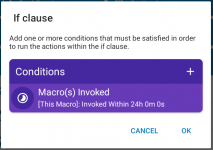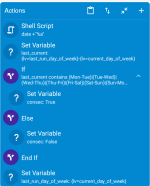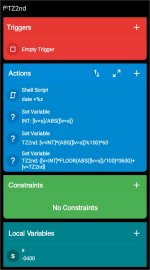KeeperCake
Member
I'd like certain action sets to depend on whether or not the macro was run on consecutive calendar days. (So that's different from the Invoked/Not Invoked constraint, natch, though I could set that to the past 24 hours. Similar function but not exactly what I'm trying for.)
Guessing there'd be ways to do this with system time. I just don't yet understand system time well enough.
The one general method I'm sure would work is to magic-text date info and/or dayofweek into local variables. The macro could then compare a variable representing the current day with a variable representing the last time it finished its actions.
I'm just trying not to overlook whatever way would be most efficient. Ideas?
Guessing there'd be ways to do this with system time. I just don't yet understand system time well enough.
The one general method I'm sure would work is to magic-text date info and/or dayofweek into local variables. The macro could then compare a variable representing the current day with a variable representing the last time it finished its actions.
I'm just trying not to overlook whatever way would be most efficient. Ideas?


